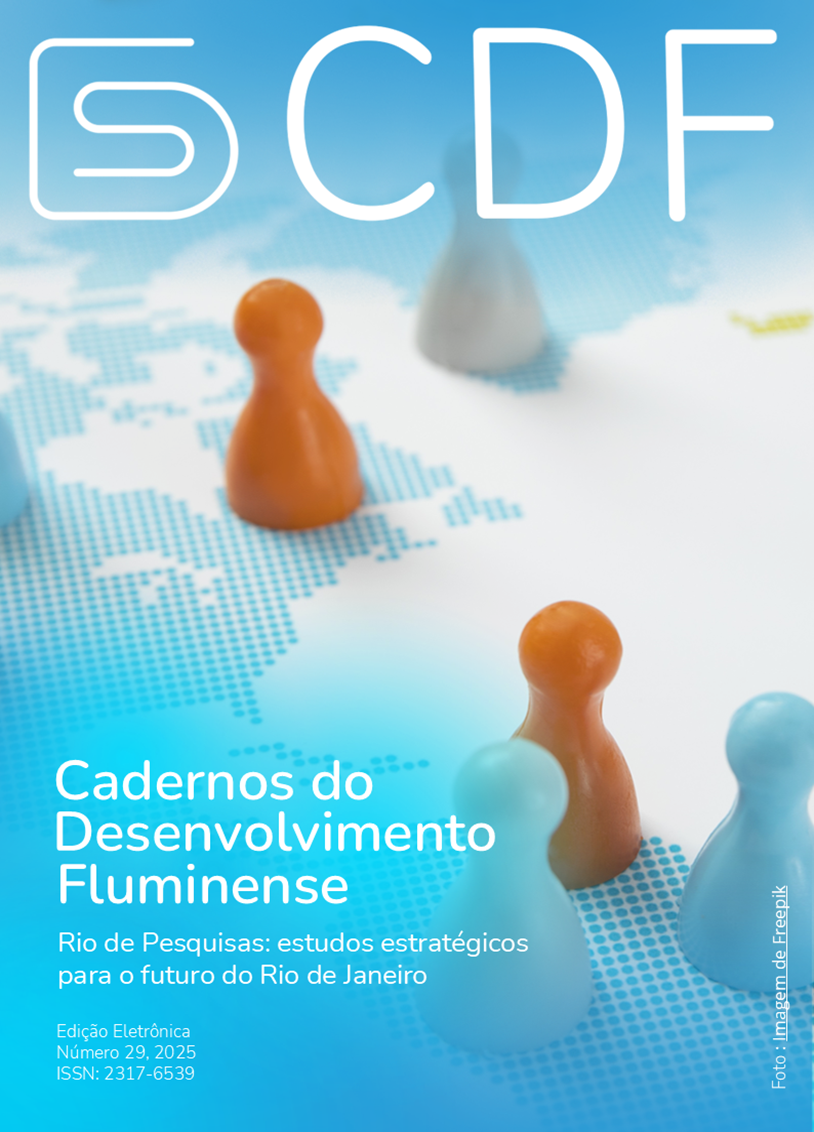DIVERSIDAD DE LAS BASES DE CONOCIMIENTO DE LAS MESORREGIONES DEL ESTADO DEL RIO DE JANEIRO
UNA NUEVA PERSPECTIVA PARA LA COMPRENSIÓN DE LA ESTRUCTURA PRODUCTIVA
DOI:
https://doi.org/10.12957/cdf.2025.88666Palabras clave:
Conocimiento, Ocupación, Regional, Desarrollo Regional, RedesResumen
El conocimiento desempeña un papel crucial en el apoyo a la innovación y la competitividad, configurando la estructura productiva e influyendo directamente en el desarrollo. Este artículo tiene como objetivo analizar la diversidad y composición de las Bases de Conocimiento (BC) —analíticas, sintéticas y simbólicas— en las mesorregiones del estado de Río de Janeiro (ERJ) entre 2006 y 2019, destacando los cambios y especificidades regionales. La metodología empleó matrices de concentración ocupacional y coocurrencia para construir redes regionales de conocimiento, proporcionando una visión detallada de la dinámica de las BC en cada región. Los resultados indican que la mayoría de las regiones perdieron BC durante el período analizado. La RMRJ presenta la mayor diversidad de BC, como era de esperarse, pero enfrenta pérdidas significativas, particularmente en BC sintéticas vinculadas a la industria manufacturera. Las regiones del Sur y Norte Fluminense destacan por su concentración en BC sintéticas, mientras que la región de las Baixadas Litorâneas muestra un crecimiento en este tipo de BC. Regiones como el Centro y el Noroeste Fluminense exhiben una menor diversidad de BC, evidenciando vulnerabilidades estructurales.
Descargas
Descargas
Publicado
Cómo citar
Número
Sección
Licencia
Derechos de autor 2025 Bianca Vasconcellos, Sra.

Esta obra está bajo una licencia internacional Creative Commons Atribución 4.0.
Os Direitos Autorais dos artigos publicados na revista Cadernos do Desenvolvimento Fluminense pertencem ao(s) seu(s) respectivo(s) autor(es), com os direitos de primeira publicação cedidos à Cadernos do Desenvolvimento Fluminense, com o trabalho simultaneamente licenciado sob uma Licença Creative Commons Atribuição, a qual permite o compartilhamento do trabalho com reconhecimento da autoria e publicação inicial nesta revista.
O(s) autor(es) tem/têm autorização para assumir contratos adicionais separadamente, para distribuição não-exclusiva da versão do trabalho publicada nesta revista (ex.: publicar em repositório institucional ou como capítulo de livro), com reconhecimento de autoria e publicação inicial nesta revista.
Autores têm permissão e são estimulados a publicar e distribuir seu trabalho online (ex.: em repositórios institucionais ou na sua página pessoal) a qualquer ponto antes ou durante o processo editorial, já que isso pode gerar alterações produtivas, bem como aumentar o impacto e a citação do trabalho publicado.

A revista Cadernos do Desenvolvimento Fluminense está licenciada com uma Licença Creative Commons Atribuição 4.0 Internacional.








